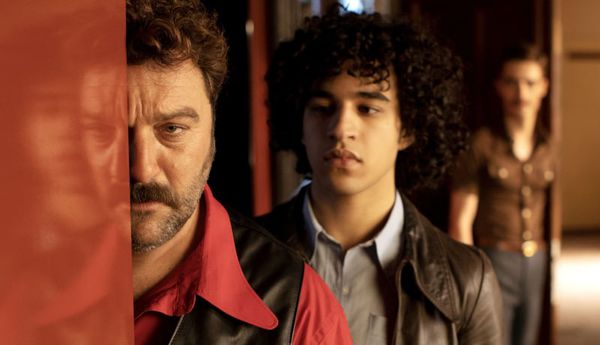Eye For Film >> Movies >> Peter Von Kant (2022) Film Review
Peter Von Kant
Reviewed by: Anne-Katrin Titze

François Ozon’s ode to Rainer Werner Fassbinder’s play and cult classic takes us on a spellbound carousel ride going round and round in circles with one man at the centre. Denis Ménochet as Peter von Kant is easily recognizable as a stand-in for Fassbinder, whose private life inspired the plot of his 1972 masterpiece. The film featured Margit Carstensen as Petra von Kant, a fashion designer who falls madly in love with a younger model named Karin (Hanna Schygulla) while living with and abusing her silent secretary Marlene (played by the perennial thin-lipped face of masochism, Irm Hermann).
Ozon in this free adaptation adds another turn of the screw by making the three protagonists male again, reversing the fashion industry background to the film world and the infatuation to an actor. The costumes by Pascaline Chavanne in Peter von Kant are excellent, especially those creamy suits and silky jewel-tone blouses for Isabelle Adjani as Sidonie (christened so by Fassbinder after a character in Theodor Fontane’s novel Effi Briest), who will introduce a new obsession, Amir (Khalil Gharbia) to her old friend and director.

Peter and Sidonie clearly have a long history and know each other well. The song Each Man Kills The Thing He Loves, based on the Oscar Wilde line and sung so hauntingly by Jeanne Moreau in Fassbinder’s Querelle, here is translated into German and given to Adjani. Ozon is no stranger to cracked mirror images taken from film history (his Frantz is a kind of remake of Ernst Lubitsch’s 1932 post-World War I drama, Broken Lullaby) and returning ghosts. Far from being a ghost, Hanna Schygulla returns later in Peter von Kant as his mother who sings him a lullaby and tries to dissuade her son from pursuing his painful new crush further. “You don’t really love him. He’s an actor!”
He insists that what he feels is pure love. Peter lures Amir with phrases about humility, travel, and proceeds to give him a screen-test, because he will, so the promise, make the young married man from Australia a star. Money and power, degradation and distrust play into this tale of obsession. It can all feel very melodramatic when you’re not in it yourself. When a forlorn Peter explains that he hasn’t “enjoyed work in six months,” it is difficult to not see him as simply a whiny big baby. Whereas the Fassbinder source cast an emotional spell that is hard to explain, this movie, despite all the interesting touches, flattens and from time to time is annoying in all its revelling in the protagonist’s pleasure in pain.
What remains is the heightened, almost overwhelming, fascinating sense of artifice in the décor, while the characters stumble around in a claustrophobia that is external as much as it is internal. The fluffy flokati rugs and gigantic reproductions of paintings depicting the arrows and wounds of Saint Sebastian or Midas and Bacchus have a firm grip on the mood - martyrdom and bad wishing, casual cruelty and sweet despair reign in this realm.
With the acts changing, so do the picturesque leaves outside the tall windows. There rests a Douglas Sirk shimmer over this doll’s house filled with cocaine and cocktails and themes that shift in non-logical ways, like thoughts. Peter doesn’t want pity. He broke up with his last boyfriend, whom he despised, he says. Sidonie who doesn’t doubt Peter’s genius as a director, brings an ever-popular dilemma to the point: “In your films you pretend to be on the side of the weak, but in your life you side with the strongest.”
Karl (Stéfan Crépon), Peter’s servant, who seems to do all the work, never speaks, and is treated like garbage by his boss, has a powerful scene that reminded me of a very short story by Bertolt Brecht, called Measures Against Power. It is in those moments when we are allowed out of the apartment, even if only in thought, that the film works best.
Early on, Peter dictates a letter for Romy Schneider about the possibility of her starring in his next film. That, in real life, would have been The Marriage Of Maria Braun. It never never happened, because Fassbinder insulted her, famously calling her a “stupid cow”, and she vowed never to work with him. Romy Schneider died May 29, Fassbinder eleven days later, on June 10, 1982. Fictional Peter remains very much alive in his prison of self-hatred and as the camera comes closer and closer, we see the bitter tears.
Reviewed on: 28 Dec 2022

















